Europe Got Its Christmas Present - a Single Supervisory Mechanism for Banks
Adelina Marini, December 13, 2012
 After more than 14 hours of negotiations and a 50/50 chance an agreement to be reached in the very last moment before an important and final for this year EU summit on December 13-14, the ministers of finance of the Union have succeeded, although with difficulty but impressively fast, in agreeing for the establishment of a single supervisory mechanism for banks (SSM). Fast because the texts of the proposal were presented by the European Commission on September 12 and now the trialogue among the Commission, the Council and the Parliament can begin with the aim to complete the task quickly. "This is a Christmas present for Europe", said at a press conference early this morning in Brussels Vassos Shiarly, minister of finance of Cyprus.
After more than 14 hours of negotiations and a 50/50 chance an agreement to be reached in the very last moment before an important and final for this year EU summit on December 13-14, the ministers of finance of the Union have succeeded, although with difficulty but impressively fast, in agreeing for the establishment of a single supervisory mechanism for banks (SSM). Fast because the texts of the proposal were presented by the European Commission on September 12 and now the trialogue among the Commission, the Council and the Parliament can begin with the aim to complete the task quickly. "This is a Christmas present for Europe", said at a press conference early this morning in Brussels Vassos Shiarly, minister of finance of Cyprus.
The path to the agreement
The meeting on December 12 was extraordinary since on December 4th the finance minsters failed to reach an agreement in spite of the very high expectations. If back then most of the participants in the meeting - the Presidency, the Commission and many ministers - stated that compromise was near and only a few small problems were left to be cleared, Germany underscored that there would be no agreement unless several fundamental for the country issues were resolved. The ministers gathered yesterday in Brussels in the early afternoon for their first public discussion where the tone and expectations were sensibly low. In the very beginning, the Cypriot Presidency announced that on one of the controversial issues - the voting modalities in the European Banking Authority (EBA) - it had failed to reach an agreement and that was why it was tabling the initial options - by the Commission and its own.
On the other key issues (the thresholds and criteria defining which banks will be directly supervised by the ECB), the Presidency proposed the following changes:
- banks with over 30 billion euros of assets fall under direct supervision;
- banks whose activities represent 20% of the GDP of a member state;
- ECB can supervise directly at least two credit institutions in every member state;
- directly supervised will be banks that are present in at least 3 member states (a home-country and two host-countries).
After announcing the changes, the discussion started cautiously. First was to speak the vice president of the ECB, Vitor Constancio, who said that the new text in general deserved support. He demanded only the third criterion defining which banks should be under direct supervision to be deleted because, he again emphasised, "the centre does not have an army of supervisors". According to him, the fact that a bank has two or more branches or subsidiaries does not say anything about its importance in a country. Its size, the share of GDP are sufficient criteria to define the systemicy of a bank.
Irish Finance Minister Michael Noonan was quite general, but he started with the 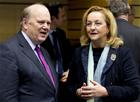 words that the supervisory mechanism was only one of the elements. We need progress on the deposit guarantee scheme and on the bank resolution scheme.
words that the supervisory mechanism was only one of the elements. We need progress on the deposit guarantee scheme and on the bank resolution scheme.
First to set the pessimistic tone was Sweden's Minister of Finance Anders Borg. He directly announced that after numerous legal consultations he requested it became clear that an equal treatment between euro- and non-euro countries could be guaranteed without treaty changes, which is not the mandate of the ministers. We are obviously in a situation where we have to introduce a double-level supervision and that is why Sweden will not take part in the banking supervision, Borg stated. Pierre Moscovici, the French finance minister, said that all parameters for a compromise were at hand. He underscored that he had no mandate for a double-level supervision and that there must be a fight for a single supervision. Poland expressed a position close to Sweden's, but it sounded much readier to compromise.
 Among the tough speakers was Bulgaria's Deputy Prime Minister and Minister of Finance Simeon Djankov, according to whom the Presidency's proposal was "too far from equal treatment". He put forward three conditions: voting in the European Banking Authority (EBA) to be via qualified majority in a combination with double simple majority; equal treatment of all member states participating in the supervisory mechanism, meaning equal voting rights in the final decision-making procedure; the appointees in the steering committee, created specifically to exert democratic control over supervision, to be appointed on a rotation principle instead of having permanent seats.
Among the tough speakers was Bulgaria's Deputy Prime Minister and Minister of Finance Simeon Djankov, according to whom the Presidency's proposal was "too far from equal treatment". He put forward three conditions: voting in the European Banking Authority (EBA) to be via qualified majority in a combination with double simple majority; equal treatment of all member states participating in the supervisory mechanism, meaning equal voting rights in the final decision-making procedure; the appointees in the steering committee, created specifically to exert democratic control over supervision, to be appointed on a rotation principle instead of having permanent seats.
The other ministers sounded even more optimistic and determined to reach a compromise before the summit. Many of them had specific remarks. For example, Danish Finance Minister Margrethe Vestager said she preferred the bank assets threshold to be 40 billion euros because, if further lowered, the ECB will need more time to qualify to work with the mechanism. Specific and ready to compromise was the representative of Austria as well - Minister Maria Fekter. She announced she preferred more flexibility in the criteria but tended to accept the texts proposed by the Presidency. Ms Fekter, though, was very forthcoming in terms of the guaranteed seats in the steering committee, which was Mr Djankov's objection too. "We cannot accept the small countries to be overridden in this way", she said and added that for Austria it would be already a big compromise to accept the very steering committee she initially 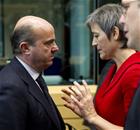 objected. "Now the proposal contains this non-European spirit in terms of equality", she concluded.
objected. "Now the proposal contains this non-European spirit in terms of equality", she concluded.
Spanish Minister Luis De Guindos again recalled how important it was to keep with the deadlines. "We have to have a clear calendar and the date should be 1st of January 2013 with a transition period", he announced and again underlined that it was important supervision to be as broad as possible. Spain is ready to discuss a further lowering of the threshold, although it is ready to accept the 30 billion euros, proposed by Cyprus. Italy, as well, stated its readiness to compromise, saying that for the country was important the threshold to be defined by the ECB, but it was inclined to accept the proposal.
And although in the beginning the tone was minor, everything was unfolding well and fed hopes for a compromise up to the moment when Wolfgang Schäuble interfered. He directly asked his colleagues why were they talking about an agreement "tonight". No one was speaking about tomorrow or before Christmas, he said and reminded them what they had gathered for - to "do the stupid work of creating legislation". The issue of direct recapitalisation of banks should be avoided because wrong expectations would be created, he said, thus burning all the hopes of participants and observers of the meeting because it was precisely the direct recapitalisation of banks that was an even more expected event but it is directly bound to the establishment of the SSM (as Germany insisted). We have to be moderate in what we can achieve and what not, Mr Schäuble added.
And threw his next bomb - the supervisory mechanism will not be available before January. He reiterated Germany's red line - a clear distinction between the ECB's monetary and supervisory tasks. And here Wolfgang Schäuble caused additional confusion by saying that he would prefer Anders Borg' proposal to be accepted to move toward treaty changes, but he said that even in the mid-term a clear distinction of the tasks would be necessary. This statement caused perplexity because it was not clear whether Germany would strive for treaty changes and only then the mechanism to be enforced or would it accept a compromise until the initiation of the changes.
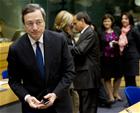 In the course of the negotiations, the ministers were joined by ECB President Mario Draghi. The bank was before that represented by Vice President Vitor Constancio. Draghi, though, did not take part in the discussions, saying he would keep his comments for later. After almost two hours and a half the ministers retired for a pause and bilateral meetings because Vassos Shiarly, the chair, said efforts must be invested in achieving a compromise before the summit on Thursday and Friday. The programme was changing on the move. Initially, a news conference was planned for 2000 CET. After a few hours of silence, in the schedule of the audiovisual service appeared a second part of public deliberations planned for 0230 in the night, which did not take part. Instead, in 0430 came a message for a final news conference.
In the course of the negotiations, the ministers were joined by ECB President Mario Draghi. The bank was before that represented by Vice President Vitor Constancio. Draghi, though, did not take part in the discussions, saying he would keep his comments for later. After almost two hours and a half the ministers retired for a pause and bilateral meetings because Vassos Shiarly, the chair, said efforts must be invested in achieving a compromise before the summit on Thursday and Friday. The programme was changing on the move. Initially, a news conference was planned for 2000 CET. After a few hours of silence, in the schedule of the audiovisual service appeared a second part of public deliberations planned for 0230 in the night, which did not take part. Instead, in 0430 came a message for a final news conference.
The agreement
In the brief conclusions it is written that the supervisory mechanism will consist of the ECB and the competent national authorities, as during the press conference Internal Market Commissioner Michel Barnier underlined that the ECB will have a leading role. The bank will be entirely responsible for the overall functioning of the mechanism. It will supervise directly banks in the eurozone, although that supervision will be differentiated and will take place in close cooperation with national supervisors. The countries outside the eurozone that wish to take part in the mechanism will be able to do so on the basis of close cooperation arrangements.
The guarantees Wolfgang Schäuble insisted on are formulated as follows: "The ECB's monetary tasks would be strictly separated from supervisory tasks to eliminate potential conflicts of interest between the objectives of monetary policy and prudential supervision. To this end, a supervisory board responsible for the preparation of supervisory tasks would be set up within the ECB. Non-eurozone countries participating in the SSM would have full and equal voting rights on the supervisory board. The board's draft decisions would be deemed adopted unless rejected by the ECB  governing council", the compromise reads.
governing council", the compromise reads.
The national supervisors will keep those functions that have not been conferred to the ECB, like for instance consumer protection, money laundering, payment services and the branches of third countries banks. The EBA, for its part, will keep its competences for further development of a single rulebook and will ensure convergence and consistency in supervisory practises. Regarding the voting rights in the EBA, the demands of the smaller member states have been taken into account, including Bulgaria's - a double simple majority. The countries that take part in the SSM will not unduly dominate the supervisory board of the authority, the document reads.
And exactly as Wolfgang Schäuble predicted, the mechanism will not be able to start operations on the 1st of January 2014, as the leaders requested in October, but on 1st of March 2014 or, as the document says, 12 months after the entry into force of the legislation.
Now it's the leaders' turn
Commissioner Barnier said with satisfaction that the construction of the banking union could now begin - step by step, brick by brick. He, however, was unable to say how many non-euro countries would join. Probably this will become clear this afternoon when the leaders gather together. Commission President Jose Manuel Barroso also welcomed the agreement, saying this was a crucial and very significant step toward completion of the banking union. Barroso hoped that the co-legislators would be able to complete the work as quickly as possible. According to Barroso, who was most pessimistic and thought the leaders were retreating from their stated ambition, the compromise demonstrated "once again that the European Union has the political will and capacity to act quickly on momentous issues".
The agreement can indeed be perceived as a Christmas gift against the backdrop of the moods of disappointment in Strasbourg on December 12th. The MEPs heard President Barroso and Andreas Mavroyiannis, Cyprus deputy minister of European affairs, on the preparations for the summit. They were very disappointed with the draft conclusions agreed by the General Affairs Council a day before, in which it is clearly stated that any planned reforms of the eurozone (Barroso's blueprint and the plan of the four presidents) depended on the adoption of the single supervisory mechanism. In fact, the conclusions reflect to a large extent Herman Van Rompuy's report and it should be taken into account that they were prepared on the basis of the lack of clarity whether  there would be an agreement on the supervision or not. Now that the agreement is a fact, the text of the conclusions will probably be substantially changed.
there would be an agreement on the supervision or not. Now that the agreement is a fact, the text of the conclusions will probably be substantially changed.
This did not prevent the leaders of political groups in the Europarliament to heavily criticise Barroso and the leaders. Joseph Daul, chief of the biggest political group (EPP), said he was not sure whether the governments realised that their manoeuvres actually undermined the European institutions. He called on them to be at the height of their commitments. Very sharp in his statement was the leader of the group of Socialists and Democrats, the Austrian Hannes Swoboda. He expressed disappointment that in his blueprint Barroso had neglected the Parliament's remarks. The Commission is self-content. If we continue with this policy, the EU will fall apart and there is no trace of a fear in your roadmap, Mr Swoboda said. The Austrian added that the draft conclusions were not  worth even the paper they were printed on.
worth even the paper they were printed on.
Even the usually strongly emotional chief of the liberals' group, Guy Verhofstadt, former prime minister of Belgium, sounded disappointed. I am very sceptical regarding the summit tomorrow and on Friday, he said. What are the draft conclusions, he asked. There is nothing in them. Only days after the ceremony in Oslo,  there will be a European Council that will prove even more divided than ever, said the Greens/European Free Alliance Co-president Rebecca Harms.
there will be a European Council that will prove even more divided than ever, said the Greens/European Free Alliance Co-president Rebecca Harms.
In fact, the draft conclusions are not that disappointing, especially against the backdrop of the reached agreement last night. They envisage in 2013 to begin closer ex ante coordination of major economic policies, as is set in the fiscal compact; moving toward an integrated financial framework (which is the anteroom for the creation of a eurozone budget), which is expected to restore the normal lending of the economy; to reach an agreement on the schemes for deposit guarantees and banks resolution; no later than March to be created the framework for direct recapitalisation of banks through the eurozone permanent fund (ESM); also in March the leaders will again return to the issue of creating a banks resolution authority - initially for the eurozone countries, but open for non-euro countries.
Will the conclusions remain the way they are, we will see today and tomorrow.
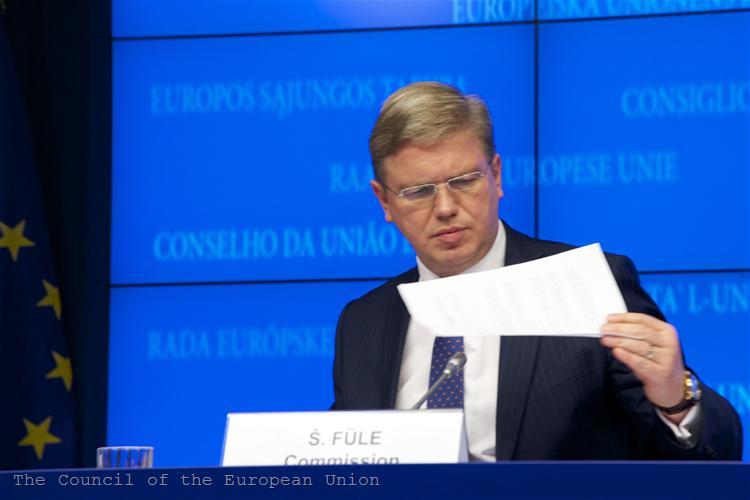 | © The Council of the European Union
| © The Council of the European Union | © European Parliament
| © European Parliament | © European Parliament
| © European Parliament | © The Council of the European Union
| © The Council of the European Union | © European Parliament
| © European Parliament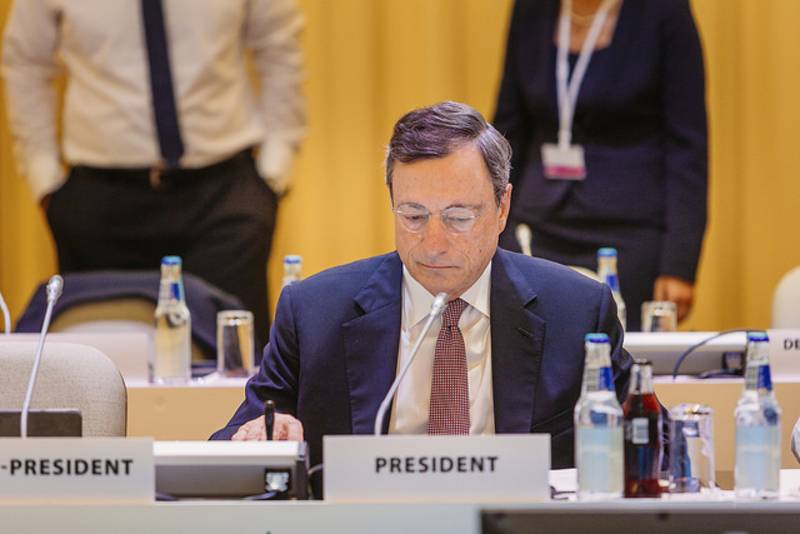 Mario Draghi | © ECB
Mario Draghi | © ECB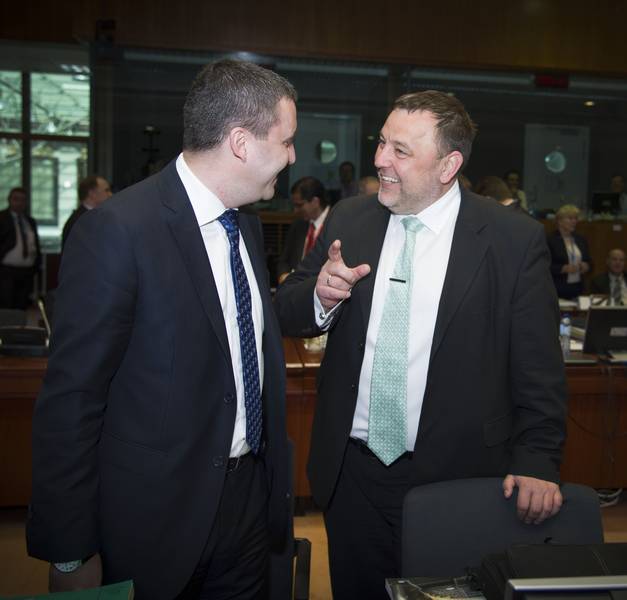 Vladislav Goranov, Sven Sester | © Council of the EU
Vladislav Goranov, Sven Sester | © Council of the EU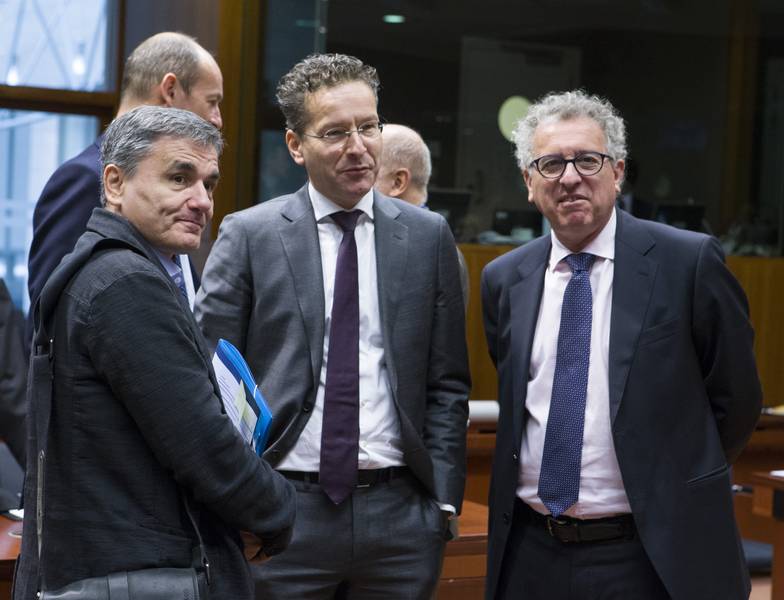 Tsakalotos, Djisselbloem, Gramegna | © Council of the EU
Tsakalotos, Djisselbloem, Gramegna | © Council of the EU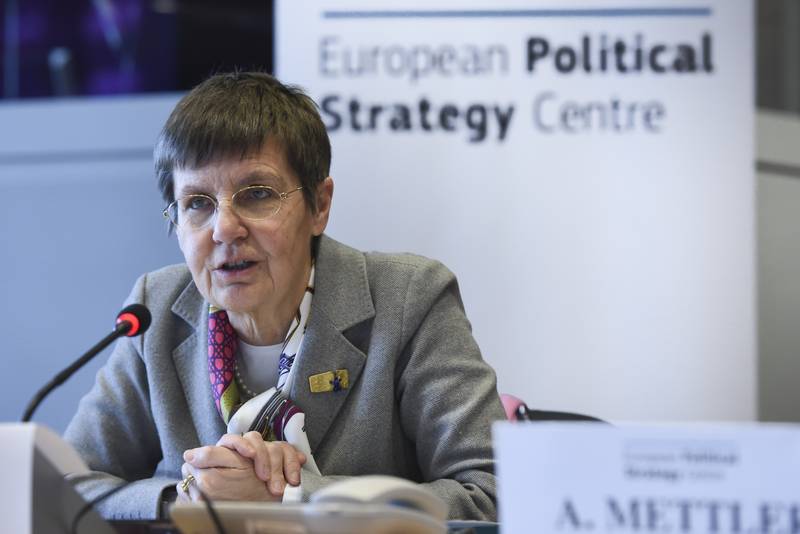 Elke Koenig | © European Commission
Elke Koenig | © European Commission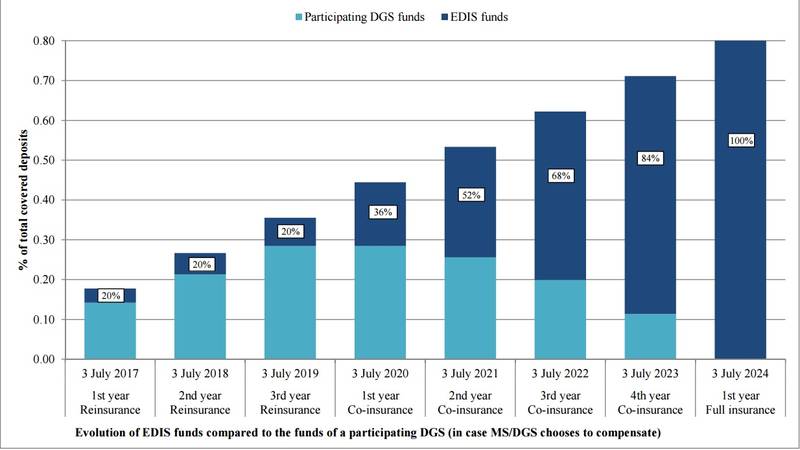 | © European Commission
| © European Commission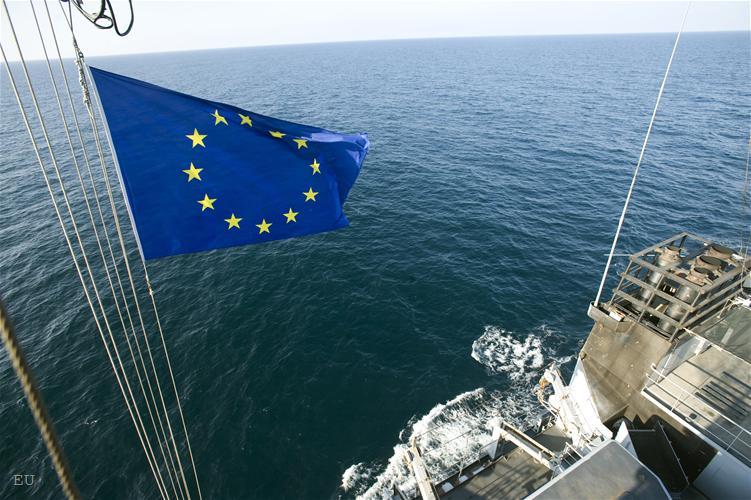 | © EU
| © EU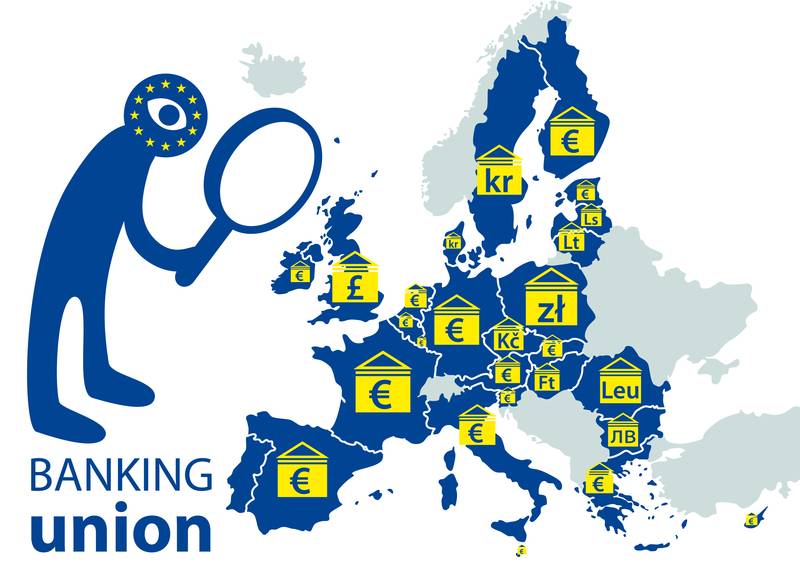 | © European Parliament
| © European Parliament